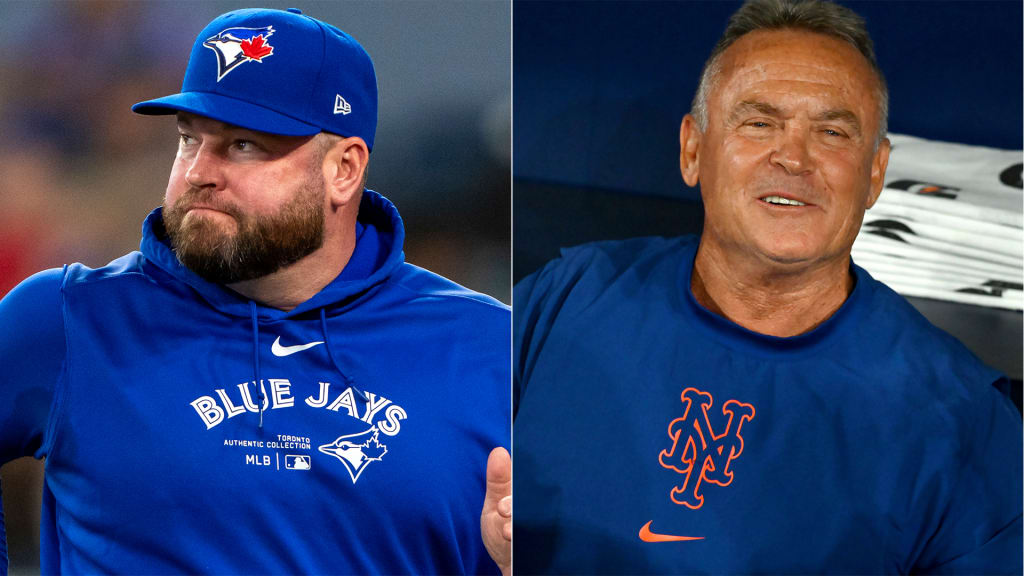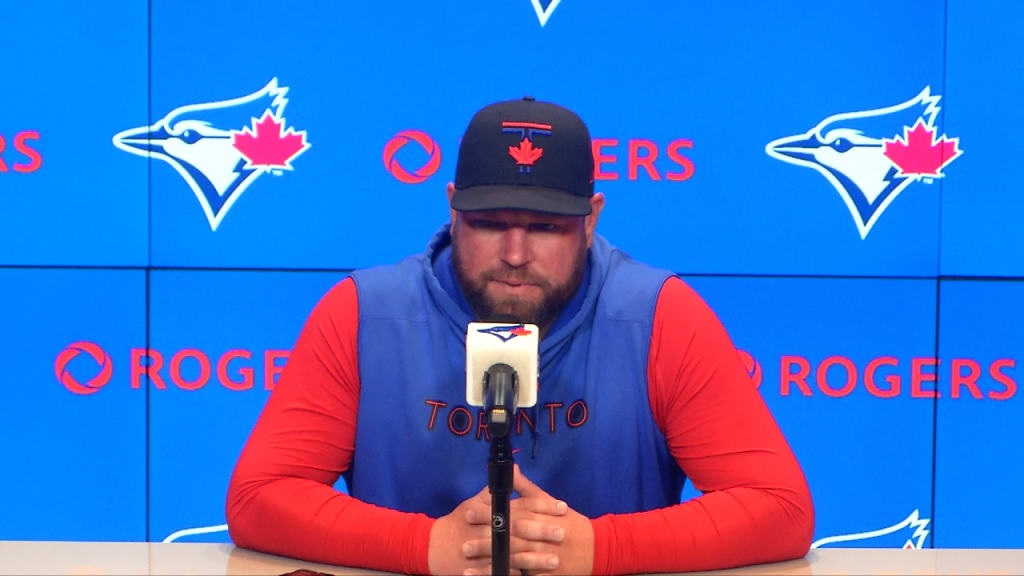'Big Schneids fan' Gibbons returns to Toronto with words of encouragement

TORONTO -- John Gibbons knows how it feels to sit in John Schneider’s chair. He has been burned by and tested the limits of its recline feature, left it and come home to it again.
In town Monday as the Mets’ bench coach, Gibbons looked just as comfortable in the visitors’ dugout at Rogers Centre, that same wry smile spread across his face with a dozen microphones pointed at him. Gibbons is beloved in Toronto, such a rarity for a former manager, but it wasn’t always this way.
Gibbons is quick to joke that, in his first stint leading the Blue Jays, he was viewed as the “right-hand man” of the GM and his longtime friend, JP Ricciardi. He was dismissed midway through the 2008 season and didn’t exactly leave town a hero, but when Gibbons returned in ‘13 and soon led the Blue Jays to those incredible postseason runs of ‘15 and ‘16, everything changed. A folk hero named Gibby was born.
Schneider is still climbing that hill. After Monday’s 3-2 loss to the Mets, he owns a managerial record of 203-178. He has taken the Blue Jays to the playoffs twice, but the only memories left of those are heartbreak. Schneider has taken criticism, which is written right into the job description, but Gibbons’ career in Toronto is a blueprint for how quickly that can change.
“I’m a big Schneids fan,” Gibbons said. “He used to come to Spring Training with us, throw BP, help with the catching and stuff like that. He’s a good baseball guy. I feel his pain, man, when he takes some heat. Everybody in this business does, and I’ve been in those spots. They got to the postseason. We would have died for that a few years back, right? It’s been in and out. He just needs to stay strong, stay positive and keep running the boys out there.”
This browser does not support the video element.
In Gibbons’ first stint managing in Toronto, Schneider was a catcher in the upper Minors with the Blue Jays. He wasn’t a top prospect or kicking the door down to the big leagues, but in Spring Training, every catcher is valuable, so Schneider spent more and more time around Gibbons and the MLB staff. That relationship grew as Schneider moved into coaching, and by late 2018 -- Gibbons’ final season in Toronto -- Schneider was brought up to the big leagues to finish the season alongside the Blue Jays’ staff.
This browser does not support the video element.
One John watched the other. There was still a manager to come between them in Charlie Montoyo, but Schneider’s time was coming.
“I learned a lot about how to handle players, and I learned a lot about how to be honest,” Schneider said. “He’s such a good baseball guy. He always had me in Spring Training, him and DeMarlo Hale. I just love the way he goes about it. He’s easy to talk to, a straight shooter, and he taught me a lot. The main thing was just watching him interact with players. Whether it was a superstar or a non-roster invite, he was always very welcoming.”
This browser does not support the video element.
That was always Gibbons’ greatest gift, managing people. He accepted the role of analytics and how the game changed around him, but above all else, Gibbons knew when to put his arm around a player, when to bark back and when to get off the tracks entirely. Those were veteran clubhouses overflowing with big personalities, and Gibbons mastered the art of keeping them all moving in the same direction. It’s why his former players speak with not just respect, but with love and genuine admiration for Gibbons.
“I watched him interact with guys like José Bautista, Josh Donaldson, Troy Tulowitzki and the pitchers. He was just himself,” Schneider said. “That goes a long way. It’s easy to be standoffish with those guys because of their emotions or their opinions, but he was just himself. That resonates.”
This browser does not support the video element.
It was subtle, but Gibbons evolved. Schneider is doing the same, now more comfortable in the role than he was in those early days. We give so little time to the idea of development for a coach or manager, but it’s possible. Managers are rarely given enough time to do so in one city -- it took Gibbons a second lap to become the manager we remember him as -- but just like a player, that patience can be rewarded.
It will only be measured by one thing, though. In Gibbons’ first ride, it wasn’t there. In his second, it was, and it’s what Schneider and the Blue Jays are still chasing.
“Any time you win,” Gibbons said, “it changes everything.”
